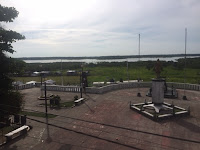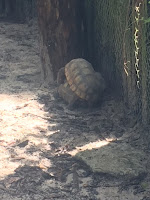Back to the airport and to our final destination - Iquitos, the capital of the Peruvian Amazon and the largest city with no road access in the world. The view from the plane was fantastic - dense jungle, windy rivers and numerous oxbow lakes. As we headed to the Hotel Cauchero, our impression of the city was uplifting. It was vibrant, welcoming, poor but not obviously poverty-stricken like some parts of Cusco and packed with moto-taxis and motorbikes that drove chaotically and with frequent horn-blowing, but without aggression or road rage. And it was very hot. Our room was basic, but clean and with aircon. No hot water of course, and as usual a bin next to the toilet to dispose of toilet paper that the sewage systems can't deal with (took a bit of getting used to). There was a bar next door that was loud and joyful, but quietened down relatively early in the evenings. We took a pleasant meander around the town, in particular along the Malecon (Esplanade) that runs along the banks of the Itaya River. We treated ourselves to a meal at 'Dawn on the Amazon' restaurant that served local food and had a menu with English translations. The Dorado fish was fabulous.
Guillermo and Devon met Peter at the hotel to discuss his fishing agenda for the next few days.
September 2
Peter headed away for his fishing expedition, and with some apprehension, I made my own plans. I took a trip to the local Animal Rescue Centre. Manatees were their focus, but they also took care of monkeys, cayman, otters, turtles and a young ocelot. All were rescued as infants and will be returned to the wild when they are rehabilitated. For manatees, this process takes 4 years, and for much of the process, they are not allowed to have human contact.
I went back to the hotel for a shower (best time of day for this) and a snooze, and then another walk around town, taking in some of the artisan shops. As it was Sunday, lots of places were closed. I had dinner at the 'Yellow Rose of Texas' restaurant, another place serving local fayre and with an English menu. Here I had 'pataraschca' - a delicious local fish dish made from fresh fish cooked in banana leaves. The city in the evening was full of families, music, young people, moto-taxis and joie de vivre. I felt quite invisible and unthreatened.
The restaurant also proudly served the 'ayahuasca diet' for those coming to Peru on a mystic / hallucinogenic retreat. Ayahuasca is a brew made of Banisteriopsis caapi vine and other ingredients, capable of inducing altered states of consciousness. It's a purge, making people vomit, and often get diarrhoea. It's believed to purify the mind through meaningful psychological experiences or visions that are healing and transformation-enabling. Several people are at El Cauchero en route to Kapitari - an ayahuasca healing centre near Iquitos.
September 3
Another day wandering in the warmth of Iquitos. I tried to go into an art gallery, but after being implored to sit and wait, found out that the place is only an Art Gallery at the weekends, and in the week it's a school! Mental note to learn more Spanish. Then the heavens opened and rain sheeted down for several minutes. It repeated this pattern during the day and flood water accumulated everywhere, including the hotel entrance. It was obviously a regular occurrence as everyone just carried on without taking too much notice. I went to look around the Boat Museum, just outside the hotel. It had a historical theme detailing the development of the rubber industry and the making of the film 'Fitzcarraldo' by German producer Werner Herzog. I also took a trip to the Culture Museum that held lots of traditional items from many of the indigenous tribes around South America (headdresses, combs, baskets, pottery, clothing, musical instruments, weapons etc). I hit the next rain shower on my way back and returned drenched. Hope the rain isn't causing problems for Peter. The evening's entertainment included another lightning storm, more patarashca and local Cusquena Wheat beer. With more rain forecast overnight, my intended river trip was doomed.
Meanwhile...
Peter took a boat trip to a place called Indiana, then a moto-taxi to Mazan. He was transported by boat to the lodge where he was staying for two nights. Lunch was perfect - steak n chips n beans n stuff - then out into the jungle catching fish with nets in the Amazon. Great to catch killifish, cichlids, knife fish, catfish and hatchet fish. These were photographed and sadly released. NZ biosecurity doesn't allow import of these fish. There were also loads of birds including kingfishers, macaws, parrots and woodpeckers. Bugs too - water stick insects, stick insects, spiders, swallow-tailed butterflies and massive metallic blue morpho butterflies. That night there was an impressive thunderstorm and the morning saw a big rise in the water level that made the planned fishing difficult. They still caught some interesting fish and ended the day back at the lodge fishing from the bank. A young local boy managed to catch a tiger shovelnose catfish that ended up on the evening meal menu. The
next morning he watched the river dolphins for about twenty minutes before breakfast then returned by boat to Iquitos.
September 4
I did a bit of gift shopping around town before Peter arrived back. Then we revisited some of the artisan places and generally had an easy day. We wandered down to a local restaurant called 'Kikiriki' (means Cockadoodledoo) for a fried chicken and plantain dinner. A bit like a Peruvian KFC but much tastier. No one spoke English but we managed to order what we wanted, with the waitress hilariously gesturing portion size and 'breast' or 'thigh' options. It was washed down with more Cusquena beer. Very yum.
September 5
Our last morning in Iquitos so we took a moto-taxi to Belen market. Known as the Venice of Peru, it's renowned for its huge market, lots of it on stilts over the Amazon. There were some warnings of petty theft (probably the only crime around Iquitos) but we felt safe and able to wander up and down the rows of produce at our leisure. There were massive piles of fish, chicken, fruit and western style clothes and goods. Peter was amazed to see heaps of fish for eating that would individually sell for a high price abroad in the aquarium trade. The suburb of Belen is under threat of being moved because of river pollution, and certainly, we saw lots of plastic and other rubbish. As the river level drops in the dry season, these become more apparent and present a hygiene issue. Not surprisingly the Belen people are resisting a move from their traditional abode.
All too soon it was time to return to the airport and back to Lima. We stayed in a hotel close to the airport and in a fairly run-down part of Lima. We took a wander to find food and stopped at a small cafe for another chicken dinner. There was no menu, they just served chicken dinners. We asked for 'dos' and a couple of 'Inca Colas' to wash it down with.
Our flight home went via Buenos Aires (Peter had a cheery conversation with a customs official about rugby), Santiago and Auckland over far too many hours. All were on time, even the final Air NZ flight!
It had been an 'other-worldly' experience. No thoughts of work or home, just immersion in the culture and natural environment. An amazing destination, a perfect holiday. Sooo lucky.







































No comments:
Post a Comment